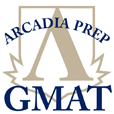If the price it pays for coffee beans continues toincrease, the Coffee ... ...
Which one of the following statements follows logically
from the statements above?
(A) If the Coffee Shoppe’s overall profitability
decreases, the price it pays for coffee beans
will have continued to increase.
(B) ...
(C) ...
(D) ...
(E) ...
*This question is included in
Free Complete Section: LR-B, June '07 LSAT
Replies to This Thread: 0
|
----
Posted: 04/17/2012 14:14
I got lost on this one. Could someone post the formal logic chain that connects to the correct answer? (C)

Admin
Replies to This Thread: 0
|
----
Posted: 04/18/2012 01:26
Here is a good answer someone else posted on a different forum.
I = Price it pays for beans continues to increase
P = increase its prices
N = sell non-coffee products
D = coffee sales decrease
L = profitability decrease
1. I -> P
2. P -> N v D
3. N -> L
4. !L -> !D
(A) L -> I
assume L, what does that tell you? nothing useful.
(B) L -> N v D
as above.
© I -> L
assume I,
P (from 1)
N v D (from 1,2)
- assume N
- L (from 3)
- assume D
- L (from 4)
L (from 2,3,4)
I -> L (conclusion)
(D) !I -> !L
assume !I, doesn't tell you anything.
(E) I v !D
isn't even a conditional, can't derive this from the premises given.

Admin
Replies to This Thread: 0
|
----
Posted: 04/18/2012 01:27
Here is another answer someone else posted. Longer, because it's in text rather than symbols.
A) If the Coffee Shoppe’s overall profitability
decreases, the price it pays for coffee beans
will have continued to increase.
No. The manager could have viewed the overall profitability as adequate to award himself a payrise, which would have reduced overall profitiability without needing an increase in the price of beans. The rent could have gone up, new taxes could have been introduced, fewer people might be stopping there to buy their coffee. These assumptions are all plausible, commonsense, and compatible with the passage, and bring about the condition of 'reduced profitability' without needing the increased prices - so this answer is wrong. This type of answer can easily be excluded from most questions by coming up with any other commonsense reason why the event it describes could have come about.
(B) If the Coffee Shoppe’s overall profitability
decreases, either it will have begun selling
noncoffee products or its coffee sales will have
decreased.
Wrong for the same reason as (A) - again, many other possible reasons
© The Coffee Shoppe’s overall profitability will
decrease if the price it pays for coffee beans
continues to increase.
"If the price it pays for coffee beans continues to increase, the Coffee Shoppe will have to increase its prices" (from the passage). If that happens, one of two things must result - selling non coffee products (leads to reduced profitability), or reduced sales (leads to reduced profitability). Therefore, according to the passage, if the the price it pays for coffee beans continues to increase, overall profitability MUST decrease. This is The Correct Response.
(D) The price it pays for coffee beans cannot
decrease without the Coffee Shoppe’s overall
profitability also decreasing.
Irrelevant to anything in the passage
(E) Either the price it pays for coffee beans will
continue to increase or the Coffee Shoppe’s
coffee sales will increase.
No reason to believe from the passage that constant prices will lead to increased sales










